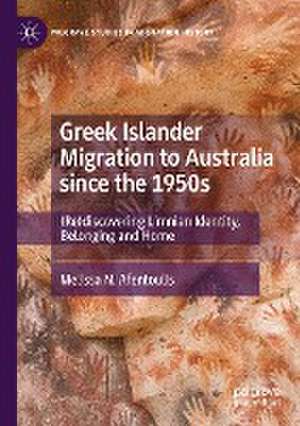Greek Islander Migration to Australia since the 1950s: (Re)discovering Limnian Identity, Belonging and Home: Palgrave Studies in Migration History
Autor Melissa N. Afentoulisen Limba Engleză Paperback – 25 noi 2022
| Toate formatele și edițiile | Preț | Express |
|---|---|---|
| Paperback (1) | 694.87 lei 6-8 săpt. | |
| Springer International Publishing – 25 noi 2022 | 694.87 lei 6-8 săpt. | |
| Hardback (1) | 700.29 lei 6-8 săpt. | |
| Springer International Publishing – 24 noi 2021 | 700.29 lei 6-8 săpt. |
Preț: 694.87 lei
Preț vechi: 817.50 lei
-15% Nou
Puncte Express: 1042
Preț estimativ în valută:
132.97€ • 139.18$ • 110.67£
132.97€ • 139.18$ • 110.67£
Carte tipărită la comandă
Livrare economică 31 martie-14 aprilie
Preluare comenzi: 021 569.72.76
Specificații
ISBN-13: 9783030856632
ISBN-10: 3030856631
Pagini: 252
Ilustrații: XXI, 252 p. 4 illus., 3 illus. in color.
Dimensiuni: 148 x 210 mm
Greutate: 0.36 kg
Ediția:1st ed. 2022
Editura: Springer International Publishing
Colecția Palgrave Macmillan
Seria Palgrave Studies in Migration History
Locul publicării:Cham, Switzerland
ISBN-10: 3030856631
Pagini: 252
Ilustrații: XXI, 252 p. 4 illus., 3 illus. in color.
Dimensiuni: 148 x 210 mm
Greutate: 0.36 kg
Ediția:1st ed. 2022
Editura: Springer International Publishing
Colecția Palgrave Macmillan
Seria Palgrave Studies in Migration History
Locul publicării:Cham, Switzerland
Cuprins
Chapter 1: Unravelling Islanders’ Migration Stories.- Chapter 2: ‘From Whence We Came’: Migration From Limnos to Australia.- Chapter 3: ‘For a Better life’: In a New Country.- Chapter 4: ‘Who Are We?’: Identity, Belonging and Place.- Chapter 5: Diasporic Meanings of Home and ‘Dual Lives’.- Chapter 6: From Pilgrimage to‘ A Way of Life’.- Chapter 7: Consolidation and Reflections About the Future.
Notă biografică
Melissa N. Afentoulis is an independent scholar interested in migration history, cultural identity and its transnational formation within diasporas. Melissa was born on the island of Limnos (better known as Lemnos), Greece and arrived in Australia in 1963.
Textul de pe ultima copertă
“A unique snapshot into the lived experiences of separation, interconnection, belonging, and one’s identity of the Limnian diaspora who settled in Australia, and views of those who remained on the island. A valuable insight into my own Australian Greek Limnian heritage.”
— Despina Whitefield, Lecturer and Student Supervisor, Victoria University, Australia
Illuminating the experiences of immigrants to Australia in the late twentieth century, this book uses oral history to explore how identity and belonging are shaped through migration. Between the 1950s and the 1970s, many inhabitants from the small Greek island of Limnos travelled to Australia to flee post-war devastation and economic disaster. With an emphasis on the lived experiences and memories of Limnians, the book sheds light on the emotional pain and trauma they felt as they were separated from their families and homeland. Moving away from more traditional outlooks on migration studies, this book emphasises the significance of ethno-regional identity, and analyses how it can bring strength and longevity to a constructed community. Both the roles of men and women within the Greek diaspora are examined, in the way that they made the difficult decision to leave their homeland, and subsequently how they came to nurture and build families within a new, evolving community. Looking beyond first-generation migration, the author analyses the pattern of return visits to Limnos by the descendants of migrants. Acting as a form of identity consolidation for second-generation migrants, this journey to the ancestral homeland highlights the fluidity of what it means to belong somewhere, and redefines the notion of ‘home’. The author provides an alternative perspective to traditional migration studies and reaffirms the importance of transnational identity. A unique and important addition to research, this book combines memory studies and oral narrative to analyse how identity and belonging can be shaped across borders, rather than within them.
— Despina Whitefield, Lecturer and Student Supervisor, Victoria University, Australia
Illuminating the experiences of immigrants to Australia in the late twentieth century, this book uses oral history to explore how identity and belonging are shaped through migration. Between the 1950s and the 1970s, many inhabitants from the small Greek island of Limnos travelled to Australia to flee post-war devastation and economic disaster. With an emphasis on the lived experiences and memories of Limnians, the book sheds light on the emotional pain and trauma they felt as they were separated from their families and homeland. Moving away from more traditional outlooks on migration studies, this book emphasises the significance of ethno-regional identity, and analyses how it can bring strength and longevity to a constructed community. Both the roles of men and women within the Greek diaspora are examined, in the way that they made the difficult decision to leave their homeland, and subsequently how they came to nurture and build families within a new, evolving community. Looking beyond first-generation migration, the author analyses the pattern of return visits to Limnos by the descendants of migrants. Acting as a form of identity consolidation for second-generation migrants, this journey to the ancestral homeland highlights the fluidity of what it means to belong somewhere, and redefines the notion of ‘home’. The author provides an alternative perspective to traditional migration studies and reaffirms the importance of transnational identity. A unique and important addition to research, this book combines memory studies and oral narrative to analyse how identity and belonging can be shaped across borders, rather than within them.
Caracteristici
Explores the experiences of both first-generation and second-generation migrants to Australia Presents findings from multiple interviews conducted with Limnians who travelled to Australia following WWII Contributes to Greek diaspora studies and demonstrates how constructed communities evolved and developed over time














